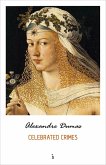Dumas chronicles the sanguinary deeds in the south of France carried on in the name of religion. The French conflicts over Reformation drenched the country in blood much the way the related conflicts blooded the English landscape (there between the Royalist "Cavaliers" and the Protestant "Round Heads" - folks we would call Fundamentalist today). The strife steeped the soil of the fair country round about Avignon in blood for a long period of years. This book was not written for children. Dumas has minced no words in describing the violent scenes of a violent time.
Dieser Download kann aus rechtlichen Gründen nur mit Rechnungsadresse in A, B, BG, CY, CZ, D, DK, EW, E, FIN, F, GR, HR, H, IRL, I, LT, L, LR, M, NL, PL, P, R, S, SLO, SK ausgeliefert werden.









